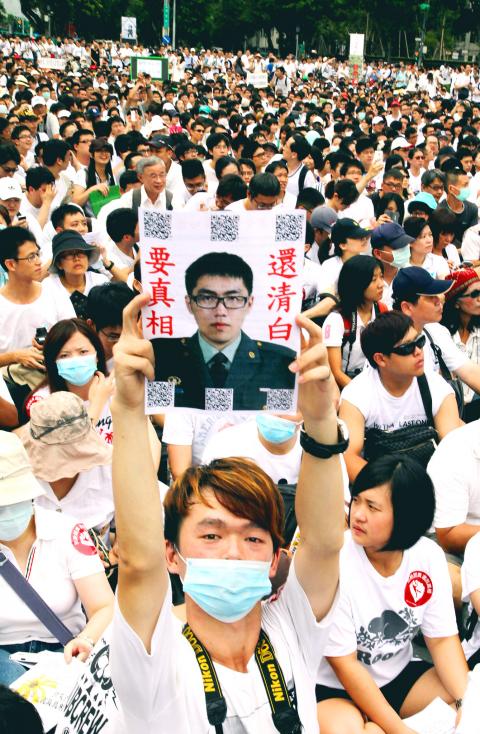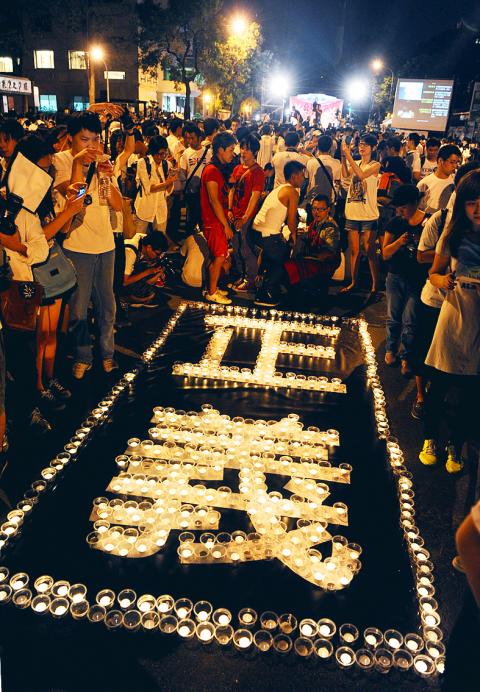Tens of thousands protesters, many clad in white, demonstrated in front of the Ministry of National Defense in Taipei yesterday, demanding that the military reveal the truth about the death of conscript Hung Chung-chiu (洪仲丘) and bring the perpetrators to justice.
Shouting slogans and holding placards bearing messages such as: “Give justice to the victim’s family,” “Ensure human rights in the military” and “Without the truth, there is no forgiveness,” the protesters also called for the inclusion of an independent third party in the investigation into Hung’s death.
Hung died on July 4, following punishing exercises he had been forced to do as part of his punishment while being confined to detention barracks.

Photo: David Chang, EPA
In making the appeal, dozens of young male protesters sang military songs with revised lyrics criticizing the army officers thought to have been involved in Hung’s death, while others made a show of drinking bottled water — a reference to reports that Hung’s superiors allegedly refused to give him water despite repeated requests.
The protesters also observed a minute of silence to mourn the deceased corporal.
Among the protesters were the parents of late naval solider Yao Tai-yuan (姚泰源), who carried a photograph of their son as they rallied. Yao’s parents say their son was pushed from a naval harbor and drowned last year, but the military did not consider his death to be a murder.

Photo: Lo Pei-der, Taipei Times
Hung’s uncle, Hu Shih-ho (胡世和), also attended the rally, where he thanked the protesters and supported their calls.
“We [Hung’s family] demand the truth,” Hu said.
Many protesters booed loudly when Deputy Minister of National Defense Andrew Yang (楊念祖) turned up on behalf of the ministry to accept a letter submitted by Citizen 1985, the civic group that had organized the rally.
“We ask the public to give the ministry a chance to rectify our errors,” Yang said, bowing to the crowd, apologizing and promising to establish Hung’s cause of death.
Citizen 1985 made three appeals in the rally: the call for the involvement of a third party; that key material evidence in the case be examined and maintained by civil professorial authorities; and that the military reform its disciplinary system, as well as its 1985 hotline complaint system.
According to the group, there are only two kinds of conscripts who dare to call the 1985 helpline, which is designed for them to voice any issues or complaints: new ones who do not know that their supervisors will likely exact revenge and outgoing conscripts who think they can escape retribution because they will soon be discharged.
The ministry later said in a press statement that it accepted the three appeals, adding that the Taoyuan District Prosecutors’ Office has agreed to take part in the case.
It also agreed that material evidence be kept and examined by civil professional authorities, and guaranteed the safety of all witnesses in the case, the statement said, adding that it would also amend the hotline system.
While the civic group had previously estimated that about 5,000 people would join in the protest, it said nearly 30,000 people showed up yesterday. Police estimated that there were 15,000 demonstrators.
The demonstration ended before noon and was followed by an evening vigil in Hung’s memory near the Legislative Yuan.
Hung was serving in the army’s 542nd Brigade in Hsinchu County and was due to be discharged on July 6. He was transferred to the 269th Brigade in Taoyuan on June 28 for disciplinary reasons after bringing a camera-equipped cellphone onto base without permission.
On July 3, Hung suffered heat exhaustion during a training session and was sent to a military hospital in Taipei. He died at the hospital of multiple organ failure after efforts to resuscitate him failed.
The incident has sparked a public outcry, partly because of the circumstances surrounding Hung’s death, including that he was confined to detention barracks for an offense that only merited a reprimand.
Many have also criticized the military for what they perceive as its lack of urgency in handling the case and seeming disinterest in learning the truth behind why Hung was detained and how he was treated while in confinement.
Additional reporting by AFP

The Ministry of the Interior (MOI) is to tighten rules for candidates running for public office, requiring them to declare that they do not hold a Chinese household registration or passport, and that they possess no other foreign citizenship. The requirement was set out in a draft amendment to the Enforcement Rules of the Public Officials Election and Recall Act (公職人員選舉罷免法 ) released by the ministry on Thursday. Under the proposal, candidates would need to make the declaration when submitting their registration forms, which would be published in the official election bulletin. The move follows the removal of several elected officials who were

The Republic of China (ROC) is celebrating its 114th Double Ten National Day today, featuring military parades and a variety of performances and speeches in front of the Presidential Office in Taipei. The Taiwan Taiko Association opened the celebrations with a 100-drummer performance, including young percussionists. As per tradition, an air force Mirage 2000 fighter jet flew over the Presidential Office as a part of the performance. The Honor Guards of the ROC and its marching band also heralded in a military parade. Students from Taichung's Shin Min High School then followed with a colorful performance using floral imagery to represent Taiwan's alternate name

FOUR DESIGNATED AREAS: Notices were issued for live-fire exercises in waters south and northwest of Penghu, northeast of Keelung and west of Kaohsiung, they said The military is planning three major annual exercises across the army, navy and air force this month, with the navy’s “Hai Chiang” (海強, “Sea Strong”) drills running from today through Thursday, the Ministry of National Defense said yesterday. The Hai Chiang exercise, which is to take place in waters surrounding Taiwan, would feature P-3C Orion maritime patrol aircraft and S-70C anti-submarine helicopters, the ministry said, adding that the drills aim to bolster the nation’s offshore defensive capabilities. China has intensified military and psychological pressure against Taiwan, repeatedly sending warplanes and vessels into areas near the nation’s air defense identification zone and across

A Chinese takeover of Taiwan would severely threaten the national security of the US, Japan, the Philippines and other nations, while global economic losses could reach US$10 trillion, National Security Council Deputy Secretary-General Lin Fei-fan (林飛帆) wrote in an article published yesterday in Foreign Affairs. “The future of Taiwan is not merely a regional concern; it is a test of whether the international order can withstand the pressure of authoritarian expansionism,” Lin wrote in the article titled “Taiwan’s Plan for Peace Through Strength — How Investments in Resilience Can Deter Beijing.” Chinese President Xi Jinping’s (習近平) intent to take Taiwan by force